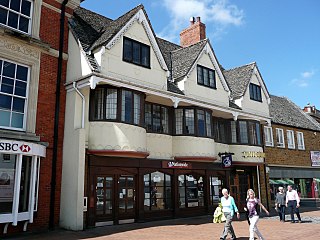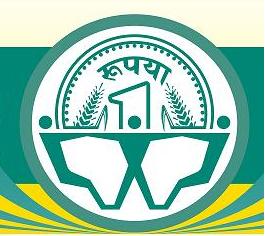
A building society is a financial institution owned by its members as a mutual organization, which offers banking and related financial services, especially savings and mortgage lending. They exist in the United Kingdom, Australia and New Zealand, and formerly in Ireland and several Commonwealth countries, including South Africa as mutual banks. They are similar to credit unions, but rather than promoting thrift and offering unsecured and business loans, the purpose of a building society is to provide home mortgages to members. Borrowers and depositors are society members, setting policy and appointing directors on a one-member, one-vote basis. Building societies often provide other retail banking services, such as current accounts, credit cards and personal loans. The term "building society" first arose in the 19th century in Great Britain from cooperative savings groups.

Rabobank is a Dutch multinational banking and financial services company headquartered in Utrecht, Netherlands. The group comprises 89 local Dutch Rabobanks (2019), a central organisation, and many specialised international offices and subsidiaries. Food and agribusiness constitute the primary international focus of the Rabobank Group. Rabobank is the second-largest bank in the Netherlands in terms of total assets.

The Co-operative Bank plc is a retail and commercial bank in the United Kingdom, with its headquarters in Balloon Street, Manchester. Established as a bank for co-operators and co-operatives following the principles of the Rochdale Pioneers the business evolved over the twentieth century into a mid sized British high street bank operating throughout the UK mainland. Transactions took place at cash desks in co-op stores until the 1960s, when the bank set up a small network of branches that grew from 6 to a high of 160. Branches for residents of the Isle of Man and the Channel Islands were closed in the 2010s during a significant rescaling exercise. Branches now number around 35.

ANZ Bank New Zealand Limited is a New Zealand banking and financial services company, which operates as a subsidiary of Australia and New Zealand Banking Group Limited of Australia. ANZ is one of New Zealand's big four banks, and is the largest bank in New Zealand with approximately 30% of market share as of March 2021.
St.George Bank is an Australian bank with its headquarters in Sydney. Since a 2008 merger, the bank has been part of Westpac, having previously been an independent legal entity. In 2010, St.George was deregistered as a company and ceased to be a standalone authorised deposit-taking institution.
A mutual organization, or mutual society is an organization based on the principle of mutuality and governed by private law. Unlike a true cooperative, members usually do not contribute to the capital of the company by direct investment, but derive their right to profits and votes through their customer relationship. A mutual organization or society is often simply referred to as a mutual.
Demutualization is the process by which a customer-owned mutual organization (mutual) or co-operative changes legal form to a joint stock company. It is sometimes called stocking or privatization. As part of the demutualization process, members of a mutual usually receive a "windfall" payout, in the form of shares in the successor company, a cash payment, or a mixture of both. Mutualization or mutualisation is the opposite process, wherein a shareholder-owned company is converted into a mutual organization, typically through takeover by an existing mutual organization. Furthermore, re-mutualization depicts the process of aligning or refreshing the interest and objectives of the members of the mutual society.

AMP is a financial services company in Australia and New Zealand providing superannuation and investment products, financial advice, and banking products including home loans and savings accounts. Its headquarters is in Sydney, Australia.

The Co-operative Group Limited, trading as Co-op, is a British consumer co-operative with a group of retail businesses including grocery retail and wholesale, legal services, funerals and insurance retailing.
Sir Ralph Norris is an Australasian business leader, knighted for services to New Zealand business in 2009. He transitioned from CIO to CEO, leading business and culture transformations across different industries. Currently the chairman of Craigs Investment Partners, Norris has held several chair and board roles and was previously CEO of ASB Bank (1991–2001), Air New Zealand (2002–2005) and the Commonwealth Bank Group (2005–2011). While at ASB, Norris was instrumental in the launch of New Zealand’s first automatic teller machines and Eftpos technology. He is known for his business turnaround acumen and 'no surprises' approach, demonstrating a practical and down-to-earth style. He led the banking industry globally in moving executive long-term incentives (LTIs) away from purely financial performance, linking them for the first time to customer satisfaction. Norris is a honorary Fellow of the Institute of IT Professionals, an ambassador of the Australian Indigenous Education Foundation, was awarded an Honorary Doctorate of Business by the University of New South Wales in 2012, and was inducted into the New Zealand Business Hall of Fame in 2014. He is a strong advocate of tertiary education.

Cooperative banking is retail and commercial banking organized on a cooperative basis. Cooperative banking institutions take deposits and lend money in most parts of the world.

The European Association of Co-operative Banks (EACB) is a European interest group representing cooperative banks in the European Union (EU) and five non-European countries. Established in 1970, the non-profit association "represents, promotes and defends" the common interests of its 26 member institutions and 2.700 cooperative banks regarding banking as well as cooperative legislation.
Co-operative Bank or Cooperative Bank may refer to:
Adarsh Co-operative Bank Ltd. is a multi-state co-operative bank with 46 branches across states of Rajasthan and Gujarat that has been in operation since 1972.

TSB Bank plc is a retail and commercial bank in the United Kingdom and a subsidiary of Sabadell Group.

Buldana Urban Cooperative Credit Society was formed on 15 August 1986. Chairman (Mr.) Radheshyamji Chandak started it with capital of 210 USD and 72 members. In a span of 27 years and mainly in last decade under managing director Dr Sukesh Zamwar, the Credit Society has grown to size of 1.1 billion dollar business with more than half a million (700,000) membership. The area of operation is mainly in central and western India in four states of India. Now the society has 333 branches and 5000 employee and 300 warehouses. Total built up area for Warehouse is 5,000,000 sq feet and capacity of 435,000 metric tons. It maintains a presence in most of the metro cities of India and also in rural areas.

Alternative Bank Switzerland (ABS) is a sustainability-oriented bank based in Olten, Canton of Solothurn, in Switzerland.
The Tamil Nadu State Apex Co-operative Bank, also known as TNSC Bank, is an Indian cooperative banking company headquartered in Chennai. It was incorporated in 1905 as an urban cooperative bank. As of 2015, TNSC Bank had 46 branches in Chennai. TNSC Bank coordinates India's entire short-term cooperative credit structure.
Equitable Bank is a Canadian bank which primarily provides residential and commercial real estate lending services, as well as personal banking through its direct banking brand EQ Bank. The bank was founded in 1970 as The Equitable Trust Company and became a Schedule I Bank offering savings products in 2013. As of 2022, it is Canada's seventh largest bank, with nearly $103 billion in assets under management. As of February 2023, the bank had over $31 billion in deposits. Equitable Bank is a member of the Canada Deposit Insurance Corporation.
Punjab & Maharashtra Co-operative Bank Limited (PMC), is a multi-state co-operative bank that began operations in 1983. It has 137 branches spread over half a dozen states of India and nearly 100 branches are in Maharashtra. It is regulated by the Reserve Bank of India and registered under the Cooperative Societies Act.











